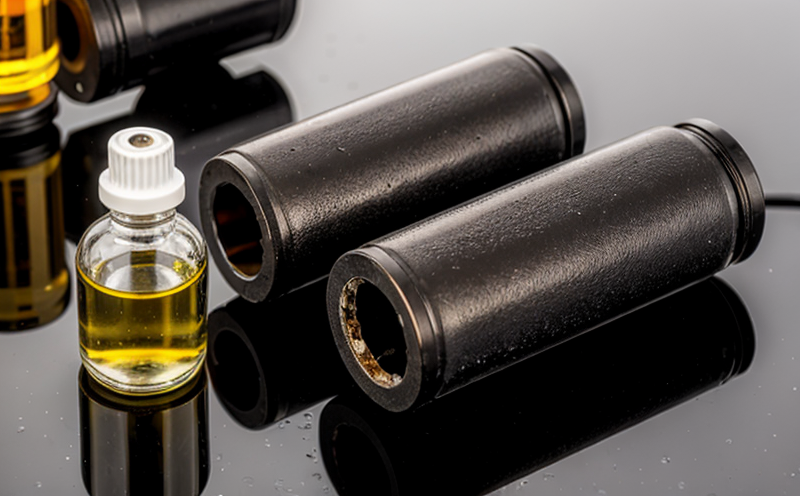ASTM D7678 Waste Oil Hydrocarbons Test in Water
The ASTM D7678 standard is specifically designed to measure hydrocarbon levels in waste oil samples that have been diluted with water. This test is crucial for industries dealing with used lubricating oils, hydraulic fluids, and other petroleum-based products that are often released into wastewater streams during manufacturing or maintenance processes.
Hydrocarbons, which consist of molecules made up entirely of carbon and hydrogen atoms, are a significant concern in environmental monitoring due to their potential toxicity. High concentrations of hydrocarbons can lead to ecological imbalances, affecting both aquatic life and the broader ecosystem. The ASTM D7678 test helps ensure that industrial operations comply with regulatory limits set by environmental agencies such as the Environmental Protection Agency (EPA) and other local authorities.
When conducting this test, it is essential to follow a series of rigorous steps to achieve accurate results. First, proper sample collection and preparation are critical; using the appropriate sampling containers and ensuring that samples are free from contamination can significantly impact the reliability of the test outcomes. Once collected, these samples undergo thorough dilution with water before analysis.
The testing process typically involves instrumental methods like gas chromatography (GC), which separates different components within a mixture based on their physical properties such as boiling point and polarity. This separation allows for precise quantification of individual hydrocarbons present in the sample. After separation, identification is achieved through mass spectrometry, providing detailed information about each compound identified.
It's important to note that ASTM D7678 also specifies strict acceptance criteria regarding precision and bias, ensuring consistency across laboratories performing this test. Compliance with these standards guarantees accurate measurement of hydrocarbon concentrations in waste oil diluted solutions, thereby supporting effective management practices aimed at minimizing environmental impact from industrial activities.
Understanding the broader context helps to appreciate why such tests are necessary within various sectors like manufacturing, energy production, and transportation where petroleum-based products play a significant role. For quality managers responsible for ensuring sustainable practices across their organizations, understanding how ASTM D7678 contributes towards achieving these goals is invaluable.
Why It Matters
The measurement of hydrocarbon levels in waste oil diluted with water as per ASTM D7678 not only ensures compliance with environmental regulations but also plays a vital role in safeguarding public health and preserving natural resources. By accurately measuring these contaminants, industries can implement strategies to reduce their ecological footprint while maintaining operational efficiency.
Compliance with regulatory requirements is just one aspect of why this test matters; it also fosters responsible business practices by promoting transparency and accountability among stakeholders involved in the production and use of petroleum-based products. Additionally, accurate measurement allows for better decision-making regarding waste management processes, ultimately leading to more sustainable operations.
From a broader perspective, reducing hydrocarbon emissions into water bodies contributes significantly toward maintaining healthy ecosystems, supporting biodiversity, and enhancing overall environmental quality. This aligns with global efforts aimed at addressing climate change and promoting cleaner environments worldwide.
Furthermore, achieving consistent results through rigorous testing procedures ensures that all parties involved—be it manufacturers, suppliers, or regulators—are working towards common goals. Such consistency builds trust between different entities within the supply chain, fostering collaboration and innovation in finding solutions to complex environmental challenges.
Eurolab Advantages
Eurolab offers unparalleled expertise and precision when it comes to ASTM D7678 testing for waste oil hydrocarbons in water. With years of experience in the field, our team of highly qualified professionals ensures that every aspect of your project receives meticulous attention from start to finish.
We pride ourselves on delivering accurate results consistently across all samples we analyze using state-of-the-art equipment calibrated according to international standards like ISO 17025. Our commitment to quality is further reflected in our adherence to strict protocols throughout the entire testing process, ensuring reliable outcomes every time.
At Eurolab, we understand that timely delivery of accurate results is crucial for decision-making processes within your organization. That's why we have streamlined our workflow to minimize turnaround times without compromising on accuracy or reliability. You can expect prompt communication and clear reporting tailored specifically to meet your needs.
Beyond just technical proficiency, Eurolab also provides comprehensive support services designed to assist you in interpreting the results of ASTM D7678 tests. Our experienced consultants offer valuable insights into best practices for managing hydrocarbon contamination issues effectively, helping you stay ahead of regulatory changes and industry trends.
Quality and Reliability Assurance
Eurolab is committed to maintaining the highest standards of quality assurance in all our services. Our laboratory adheres strictly to ISO 17025 accreditation, which sets stringent requirements for technical competence, performance, and impartiality. This ensures that every test conducted meets rigorous criteria established by recognized international bodies.
Our commitment extends beyond compliance with standards; we continuously strive to improve our methodologies through ongoing research and development efforts. By staying at the forefront of technological advancements in analytical chemistry, Eurolab remains capable of delivering cutting-edge solutions for complex testing challenges faced by clients across various industries.
In addition to internal quality control measures, Eurolab participates actively in proficiency testing programs organized by external organizations such as A2LA (Accreditation Laboratory). These programs provide an independent assessment of our technical capabilities and help us identify areas for improvement continuously. Participation in these initiatives enhances trust between us and our clients while ensuring consistent excellence across all projects.
At Eurolab, we take pride in providing not only reliable but also transparent results that can be confidently used as evidence during audits or regulatory submissions. Our dedicated team works closely with each client to understand their unique requirements before designing a tailored testing plan suitable for their specific needs. This approach ensures that every project receives personalized attention from start to finish.





